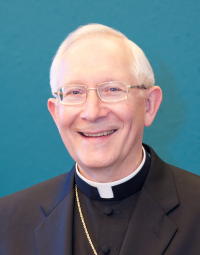
Archbishop Leonard P. Blair
The public advocacy that is made on behalf of our Catholic schools is featured in this edition of the Transcript, and a new academic year is under way. I have often spoken about the importance of Catholic education and the need we all have to support it. I would like to highlight another aspect, one that is no less important — perhaps even more important — when it comes to our children and their schooling.
When I was bishop of Toledo, there was a group in that diocese whose motto was “Think parent.” Their message was simple: Today more than ever, the Church needs to educate and help parents in their God-given responsibility to raise their children. The most fundamental thing we can do for our young people and our schools is to support parents!
Catholic schools and religious education programs for all our children are essential. However, as the Church has always taught, as studies show, and as common sense dictates, parents are the single greatest influence on their children. When young people are asked about the greatest influence in their lives, the vast majority say the biggest influence is their parents.
The Catechism of the Catholic Church teaches that “the right and the duty of parents to educate their children are primordial and inalienable.” (2221)
Sadly, state governments do not always respect or support the rights of parents to choose an education for their children. Catholic parents, for example, are not afforded any substantial help to make the choice of parochial school possible for their children, even though our schools meet or exceed state standards.
The role of parents is also eroded at a deeper level. Young people still look to their parents, but parents themselves are often unsure of asserting themselves as parents or are overwhelmed by competing influences on the life of their children. For example, popular culture and the media are multibillion-dollar industries directed at the young with messages that often do not reflect reverence for God, parents, lawful authority or a true understanding of human personhood, freedom, virtue or sexuality. And here, too, the state is more and more coercive, even to the point of claiming to redefine the divine institution of marriage and family.
Parenthood is not created or defined by the state, but by God. It is actual parents — not schools, government, child advocates or even churches — who have a divinely conferred and graced responsibility to raise their children and to educate them. There is certainly an important role – in some cases a very necessary role — for step-parents, adoptive parents, foster parents or others who have been given legal custody of a child for compelling reasons. However, these do not take away from the fundamental reality of a child’s biological father and mother.
The following words of Pope St. John Paul, spoken many years ago, are still very valid: “It is not enough to affirm and defend this principle of the parent’s right … In this field, goodwill, love itself are not sufficient. It is a skill that parents must acquire with the grace of God, in the first place by strengthening their own moral and religious convictions, by setting an example, by reflecting also on their experience, with each other, with other parents, with expert educators, with priests … In this way young people — strengthened in their Christian identity to face in the right way a pluralistic world often indifferent or even hostile to their convictions — will be able to become strong in faith, serve society, and take an active part in the life of the Church.” (International Family Congress, Oct. 30, 1978)
